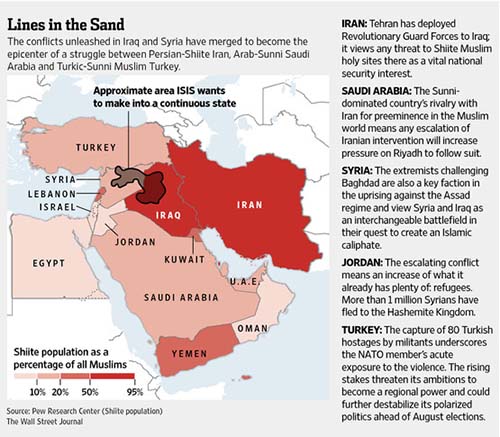July 22, 2014
The unintended consequence of the U.S. Iraq war, the so-called Arab Spring, and the Syrian conflict, is the collapse of the post-World War I partition of the Ottoman empire by the British and the French. Perhaps, we are now seeing the inevitable Balkanization of the middle east and maybe that is not such a bad thing.
Let’s look back. In the winter of 1915-1916, two diplomats, Sir Mark Sykes of Britain and François Georges-Picot of France, secretly met to decide the fate of the post-Ottoman Arab world. According to the Sykes-Picot Agreement, the British and French divided up the Arab world between themselves. The British took control of what is now Iraq, Kuwait and Jordan. The French took what is now modern Syria, Lebanon, and southern Turkey. The status of Palestine was to be determined later, with Zionist ambitions to be taken into account. The zones of control that the British and French took allowed for some amount of Arab self-rule, but with European control. In other areas, the British and French were given total control.
The division was arbitrary, taking no account of the ethnic or religious groups within the divided areas. A large Kurdish population – about 30 million today – was divided between today’s Turkey, Iran, Iraq and Syria. Shiite Arabs were split between today’s Iraq, Kuwait, Bahrain and the eastern provinces of Saudi Arabia. The Alawites, a dissident Shiite sect, reside along today’s northern Lebanese, Syrian and southwestern Turkish coasts. The Druze were distributed between today’s Israel, Lebanon and Syria. Lebanon, supposedly a Christian safe place, included large Sunni and Shiite populations as well as Alawites and Druze. Sunni Arabs, the dominant population of the Middle East, were divided into numerous states. Pockets of Turkomen, Circassians, Assyrians, Yazidis and Chaldeans were isolated throughout. At the beginning of the 21st century, minority ethnic groups ruled Iraq, Lebanon, Syria and Bahrain, often repressively.
Today the Kurds are considered to be the largest stateless national group in the world. The Kurds in northern Syria, with the backing of Iraqi Kurdistan and the strong disapproval of neighboring Turkey, have declared autonomy.
Iraqi Kurdistan is already a fully autonomous region and has been spared much of the chaos that has afflicted the rest of the country in the past few years. In the face of the recent Islamic State in Iraq and Syria (ISIS) advances, Iraqi Kurds have actually gained ground as they took control of Kirkuk, a key oil hub. This has fueled fears in Iraq that Iraqi Kurdistan may declare itself a fully independent state. Iraqi Kurdistan already runs itself in much the same way an independent nation would: It has its own armed forces, and it has been selling its own oil for half the price of what the rest of Iraq charges through a pipeline to the Turkish port of Ceyhan. It is estimated that the Kurdish region contains a quarter of all of Iraq’s oil.
ISIS now occupies vast areas of Iraq including Mosul, Iraq’s second largest city. It controls territory greater than many countries and now rivals Al-Qaeda as the world’s most powerful jihadist group. If the Syrian conflict finally ends with President Bashar al-Assad still in control, what will he do about the Syrian territory now in ISIS control?
Remember T.E. Lawrence of Laurence of Arabia fame? During the closing years of the war, Lawrence sought, with mixed success, to convince his superiors in the British government that Arab independence was in their best interests. The secret Sykes-Picot Agreement between France and Britain contradicted the promises of independence he had made to the Arabs. Perhaps, the Arabs are finally seizing the independence that was denied them.
President Obama is correct in not trying too hard to “fix” what is going on in Iraq and Syria.



 The Hunger Site
The Hunger Site
August 28, 2014 at 8:26 am
I remember a very astute cartoon from back during Desert Storm. 2 GI’s standing in the desert, one says to the other, “What’s our oil doing under their sand”